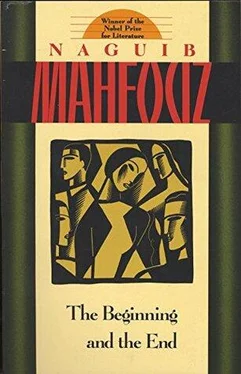Naguib Mahfouz - The Beginning and the End
Здесь есть возможность читать онлайн «Naguib Mahfouz - The Beginning and the End» весь текст электронной книги совершенно бесплатно (целиком полную версию без сокращений). В некоторых случаях можно слушать аудио, скачать через торрент в формате fb2 и присутствует краткое содержание. Год выпуска: 2016, Издательство: Anchor Books, Жанр: Классическая проза, на английском языке. Описание произведения, (предисловие) а так же отзывы посетителей доступны на портале библиотеки ЛибКат.
- Название:The Beginning and the End
- Автор:
- Издательство:Anchor Books
- Жанр:
- Год:2016
- ISBN:нет данных
- Рейтинг книги:4 / 5. Голосов: 1
-
Избранное:Добавить в избранное
- Отзывы:
-
Ваша оценка:
- 80
- 1
- 2
- 3
- 4
- 5
The Beginning and the End: краткое содержание, описание и аннотация
Предлагаем к чтению аннотацию, описание, краткое содержание или предисловие (зависит от того, что написал сам автор книги «The Beginning and the End»). Если вы не нашли необходимую информацию о книге — напишите в комментариях, мы постараемся отыскать её.
The Beginning and the End — читать онлайн бесплатно полную книгу (весь текст) целиком
Ниже представлен текст книги, разбитый по страницам. Система сохранения места последней прочитанной страницы, позволяет с удобством читать онлайн бесплатно книгу «The Beginning and the End», без необходимости каждый раз заново искать на чём Вы остановились. Поставьте закладку, и сможете в любой момент перейти на страницу, на которой закончили чтение.
Интервал:
Закладка:
Once, when she raised her eyes, she saw their legs touching. So absorbing was that sight to her that she regained her awareness only when the bride slapped the bridegroom on the hand, saying to him half coyly, half threateningly, “Be careful!”
Nefisa was so absorbed in her fancies that she almost collided with the others who were walking in the street. A burning desire for love overcame her. Throughout her life she had not found a single heart with love and compassion for her. Her strained nerves found vent only in laughter, mocking herself, her brothers, and others. Thus she became known for her light-hearted laughter, although it concealed a profound bitterness. She could not avoid such feelings. In fact, her female instinct was the only part of her that was free from blemish; it was ripe and warm. A captive urge, imprisoned by her upbringing, by dignity and family, tortured her. But the scene she witnessed in the bride’s house was enough to shake her violently and cruelly. When she thought of Nasr Allah, a fresh, tantalizing hope revived in her breast. There she saw Amm Gaber Soliman’s grocery, which lay a short distance from her house. There also was Soliman Gaber Soliman, Gaber’s son and apprentice. Since her family had dismissed their servant, Nefisa frequently went to the grocery to buy what they needed. Thus began her acquaintance with the young man, and it became closer as time went on. She conjured up before her the image of the young man, tall and stout, rather dark, with an oval face and narrow eyes. She asked herself: Did he really show interest in her or did she imagine it? It seemed that he had smiled at her hesitantly many times. Perhaps he could not forget, despite their circumstances, that she was the daughter of the late Kamel Effendi. Although she wasn’t pretty, she still looked like a respectable girl, while Soliman was only the son of a simple grocer, and he was only an apprentice in his father’s shop. She was aware of all this, but she could not afford to reject any man, whoever he might be, who seemed interested in her. She couldn’t afford not to love anyone who loved her. All of a sudden, resentment and a kind of lukewarmness returned to her, and her old despair engulfed her. Her heart said: Don’t deceive yourself and allow false hope to make you lose your head. Be contented with despondency. It will give you relief, which is the sole consolation for a girl like you, without money, beauty, or a father.
But she knew that she would not listen to her heart or obey the voice of her fears. The closer she approached the blind alley where she lived, the greater became her surrender to hope and tenderness. She thought: God is omnipotent. Inasmuch as He ordains my sorrow, He can, be it His will, grant me hope and comfort. He is my sole hope and He will never let me down. I have not done anything wrong to deserve humiliation. Neither has our family. So this anguish is bound to be dispelled. But Soliman is an obscure person. Will Hassanein accept him? My brothers are all proud, and I do not think our poverty will diminish their pride. Hassan behaves like an outsider. Oh! To think of Hassan. I wish he could change his attitude and save us from our distress. My father’s pension and my work are not enough. And what has Hassan done? Nothing. None of them will accept Soliman, and nobody better than Soliman will ever come to me. How can I make sure that he is really interested in me? With her eyes fixed on Amm Gaber Soliman’s grocery store, she continued until she reached the alley. She thought of going to the grocery to buy something…anything. Without hesitation, she went to it. The old Amm Gaber Soliman was sitting at his small desk, busy working on his ledger, while his young son Soliman Gaber Soliman stood behind the counter at the entrance. As soon as the girl stood before him, the young man became aware of her; he looked at her with a jubilant face, and his narrow eyes brightened. His features betrayed foolishness, bestiality, and cowardice. The only part of his face that could be described as handsome was his short mustache. He spoke first. “Anything I can do for you, Miss Nefisa?”
Blinking in confusion, she replied, “Give me one piaster’s worth of Tahania sweets.”
He took a knife, cut an ample portion, and, slicing a little extra piece, he said to her in a low voice, “This slice is for you alone, Miss Nefisa.”
He wrapped up the sweet in a paper and handed it to her, then took the piaster, watching his father out of the corner of his eye. Noting that his father was busy working on his ledger, he became encouraged.
“I shall keep your piaster for good luck.”
She smiled faintly and went away. She had smiled deliberately as if she wanted to encourage him. That cost her a great effort. He is no longer content with the language of the eyes, and he did well when he spoke, she thought, and in spite of his humble position and appearance, her heart beat with delight and she was overcome with excitement. Before it actually happened, she had played the scene over in her mind while she was engaged in her work for the bride. Reality turned out to be only slightly different from her imagination. She had imagined herself standing before him to buy Tahania sweets, and he, devouring her with his eyes, had said to her, as he was taking the piaster, “You are sweeter than sweet.” He hadn’t actually said that, but he’d said something similar. She sighed with relief and her imagination flew to the memories of her past loves! Her first was a minister whose picture she had seen in Al Musawar magazine, and she had embroidered around his picture some rosy daydreams in which she imagined herself begetting a unique child by him. The second was Farid Effendi Mohammed himself, and because of her love for him, she quarreled with his wife and family. As for Soliman, he was the worst of the lot. Yet he was the only one who actually existed.
When she reached the middle of the courtyard, she began to fear that her mother would scold her for spending the whole day outside the house. This aroused her resentment and she imagined herself replying: “Stop scolding me, I can no longer bear it. What I am suffering from is enough.”
Her voice rose, ringing in the staircase. Cautiously, she looked around her, and with her fingers suppressed a laugh that almost escaped her lips.
TWENTY-ONE
Hassanein left Farid Effendi Muhammed’s flat and closed the door behind him. He was extremely depressed. He walked toward the stairs, suffering with despair and frustration. But he stopped, putting his hand on the banister. He raised his head to follow the rustle of a dress. He saw the hem as the wearer climbed the last flight of stairs leading to the roof of the house. Who was it? He knew all the occupants of the house very well. Which of them was it, dressed in that red color? His heart beat violently, and he felt some power urging him to climb upward. He cast a wary look at the closed door and listened with attention and anxiety. On tiptoe, he crossed the corridor in front of the flat and walked toward the last flight of stairs leading to the roof. Perhaps it was she. He had seen her no more, either in the room or in the hall, since he threw his folded letter at her feet. She had disappeared in anger, and was, undoubtedly, indifferent to his letter and emotions. Thus the teaching hours became tedious and a torture to him. Noiselessly he climbed up the stairs until he reached the last flight. He saw the slanting rays of the setting sun level with his eyes. Waves of gentle breezes blew on his forehead. He looked all over the roof, from its front ledge overlooking the alley to its back ledge; but he found no trace of a human being. There was nothing on the roof but two wooden chicken houses. One of them faced the door to the roof, and the other, which belonged to Farid Effendi’s family, stood in a corner beside the back ledge. He silently approached the second chicken house and stood near the door, pricking his ears. At first, he heard only the cackle of chickens. Then he heard a voice clucking to the chickens. He could not tell whose voice it was. Afraid that the girl’s mother might be inside, he retreated a step. He was about to flee. But the door opened, and on its threshold appeared Bahia in a red overcoat. Her blue eyes widened in amazement, and they were fixed dumbfounded on him. She blushed so intensely that her face resembled the red velvet of her overcoat, but her blush lasted only for a few moments. Then, controlling her feelings, she crossed the threshold and closed the door. She went away from him, walking toward the door of the roof. But he did not allow her to escape, leaping to block her way. She gave him an angry look and indignantly straightened her head.
Читать дальшеИнтервал:
Закладка:
Похожие книги на «The Beginning and the End»
Представляем Вашему вниманию похожие книги на «The Beginning and the End» списком для выбора. Мы отобрали схожую по названию и смыслу литературу в надежде предоставить читателям больше вариантов отыскать новые, интересные, ещё непрочитанные произведения.
Обсуждение, отзывы о книге «The Beginning and the End» и просто собственные мнения читателей. Оставьте ваши комментарии, напишите, что Вы думаете о произведении, его смысле или главных героях. Укажите что конкретно понравилось, а что нет, и почему Вы так считаете.












